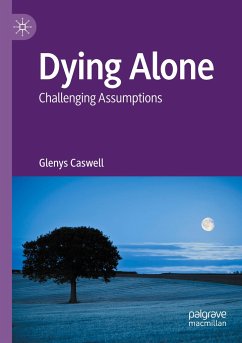This book presents a sociological challenge to the long-held assumption that dying alone is a bad way to die and that for a death to be a good one the dying person should be accompanied. This assumption is represented in the deathbed scene, where the dying person is supported by religious or medical professionals, and accompanied by family and friends. This is a familiar scene to consumers of culture and is depicted in many texts including news media, fiction, television, drama and documentaries. The cultural script underpinning this assumption is examined, drawing on empirical data and published literature. Clarification is offered about what is meant when someone is said to die alone: are they alone at the precise moment of their death, or is it during the period before that? Questions are asked about whose interests are best served by the accompaniment of dying people, whether dying alone means dying lonely and whether, for some individuals, dying alone can be a choice andoffera good death? This book is suitable for scholars and students in the field of dying and death, as well as practitioners who work with dying people, some of whom may wish to be alone.








